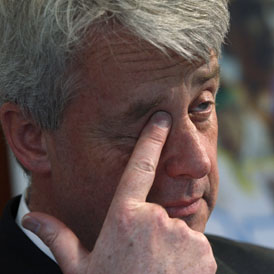Doctors call on Government to scrap NHS reforms
Doctors have urged the Health Secretary to abandon plans for a radical overhaul of the NHS. But the BMA stopped short of embarrassing Andrew Lansley further with a vote of no confidence.

The British Medical Association (BMA) has voted to urge the Government to scrap its plans to reform the NHS.
Delegates from the union and professional body, which has 140,000 members, voted in favour of calling on Health Secretary Andrew Lansley to withdraw the Health and Social Care Bill and for a “halt to the proposed top-down reorganisation of the NHS”.
Almost 400 doctors are meeting in central London at the BMA’s first special representative meeting in 19 years. The hastily-arranged summit is a sign of how much anger the Government’s plans to give more power to GPs and introduce more private competition into the NHS have provoked.
Mr Lansley’s reforms will scrap Primary Care Trusts and Strategic Health Authorities, which currently control about 80 per cent of the NHS budget. Instead, consortia of GPs will buy large chunks of care, including hospital admissions, ambulance services and district nurses.
Read more in the Channel 4 News Special Report on the NHS
That will put £80bn of NHS funds in the hands of doctors and private companies expected to manage the new consortia by 2013.
Earlier this month, Channel 4 News revealed that one such company was already drawing up projections of how they would profit from the new system. A leaked document showed that the firm, Integrated Health Partners, predicted that it might become so profitable within three to five years that it could float itself on the stock market.
No confidence vote lost
Doctors voted against passing a motion of no confidence in Mr Lansley after being urged by BMA chairman Dr Hamish Meldrum not to “personalise” the issue.
He told delegates a no-confidence vote would also make it harder for the BMA to engage with the Government.
One motion had called for Mr Lansley to resign, while another compared him to a secondhand car salesman, asking members to agree “that this Meeting would not buy a used car off someone who had trumpeted no ‘top down’ re-organisation of the NHS prior to being elected and then proceeds to introduce a massive and clearly long planned re-organisation of the NHS after being elected”.
Some BMA divisions urged the organisation to back industrial action and support “save the NHS” marches and rallies.
Doctors also accused Mr Lansley of using “inaccurate and misleading information to denigrate the NHS”, by comparing UK cancer and heart disease rates with those in Europe.
FactCheck: Is Lansley misleading us over the NHS?
Addressing the meeting, Dr Meldrum said the Government’s reforms could have “irreversible consequences” and would damage patient care.
He said: “The Government’s proposed reforms have far-reaching and potentially irreversible consequences for how the NHS is run and the way we deliver care to our patients.”
He said it was difficult to argue against some of the Government’s claimed objectives, including greater involvement of clinicians in decision-making and more information for patients.
“But, as on so many occasions, it’s the reality not the rhetoric that counts and it’s the reality that is causing all the problems,” he added.
“Because what we have seen is an often contradictory set of proposals, driven by ideology rather than evidence, enshrined in ill-thought-through legislation and implemented in a rush during a major economic downturn.”
Liberal Democrat rebellion
The meeting came after Liberal Democrat delegates rejected the shake-up at the party’s spring conference, with members voting not to support the “damaging and unjustified” reforms.
The Government’s plans also face strong opposition from other unions, including Unite and the Royal College of Nursing (RCN).
The BMA has said the Government should act on criticisms from those who are opposed to the Bill and accept there is “no electoral mandate” for the plans, which were not part of the election manifesto of either the Conservatives or the Liberal Democrats.
Opponents of the NHS shake-up have posted numerous messages on Twitter. The actor and comedian David Schneider tweeted: “Hey Andrew Lansley. So if 100s of doctors told you not to go ahead with an operation, you’d still go ahead with it?”
The Department of Health said more than 5,000 GP practices across the country have already signed up to the plans and have already started to implement them.
A spokesman said: “We are absolutely committed to the future of the NHS.
“We hope to continue to work closely with the BMA and all other health professionals to cut bureaucracy and give doctors the power and freedom to make the service more responsive to patient needs.”
A spokesman for Prime Minister David Cameron said: “We are clearly disappointed that the BMA has decided to oppose elements of this Bill that they previously supported, rather than work constructively with us to improve services to patients.”
The spokesman added that the BMA’s own surveys showed that today’s decision was “not completely representative of its membership”.
Earlier, GPs voted in favour a motion supporting the “principles of clinician-led commissioning of services” – one of the major changes in the Bill.
But they said this could be achieved without the need for further legislation.
Health Minister Simon Burns said: “It’s been a day of confusing messages from the medical union, the BMA.
“Fortunately our policy of protecting the NHS’s budget and its values remains clear.”